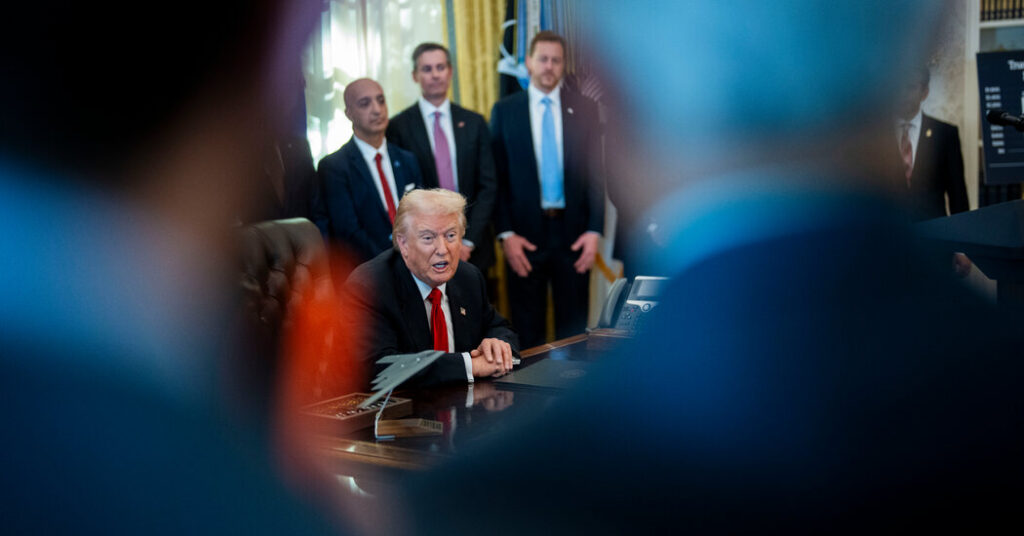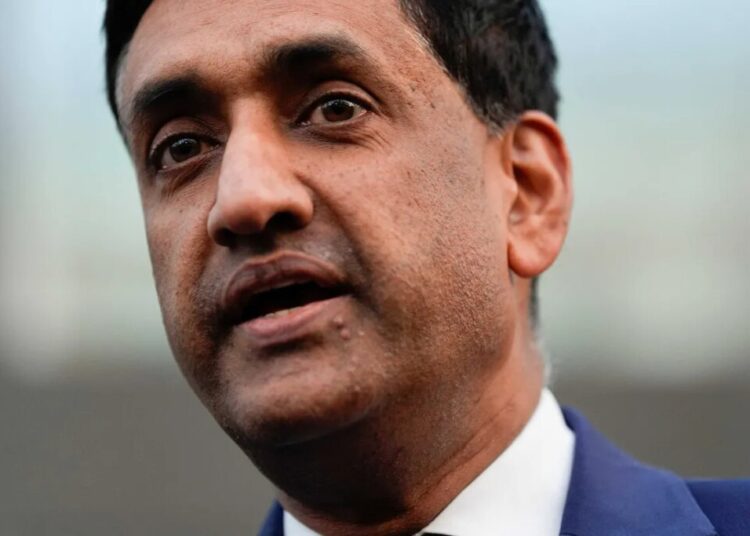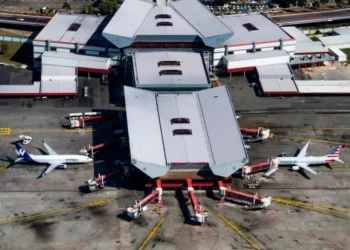The Trump administration is rapidly escalating its pressure campaign against Venezuela, with America’s largest aircraft carrier, the Ford, about to take up a position within striking distance of the country, even as President Trump’s aides provide conflicting accounts of what, exactly, they are seeking to achieve.
Mr. Trump held back-to-back days of meetings at the White House over the past two days, reviewing military options, including the use of Special Operations forces and direct action inside Venezuela.
It is still not clear whether Mr. Trump has made a decision about what kind of action to authorize, if any. On Friday, he told reporters on Air Force One that “I sort of made up my mind.” “I can’t tell you what it is,” he said, “but we made a lot of progress with Venezuela in terms of stopping drugs from pouring in.”
It is possible Mr. Trump is relying on the arrival of so much firepower to intimidate the government of Nicolás Maduro, who the United States and many of its allies say is not Venezuela’s legitimate president. Mr. Maduro has put his forces on high alert, leaving the two countries with their weapons cocked and ready for war.
There were signs that the administration was moving into a new and more aggressive posture. Shortly after a meeting on Thursday, Defense Secretary Pete Hegseth posted on social media that the mission in the Caribbean now had a name — “Southern Spear.” He described its goal in expansive terms, saying the operation “removes narco-terrorists from our Hemisphere.”
“The Western Hemisphere is America’s neighborhood,” he wrote, “and we will protect it.” With the arrival of the Ford and three accompanying missile-firing Navy destroyers, there are now 15,000 troops in the region, more than there have been at any time in decades.
The only thing missing is a strategic explanation from the Trump administration that would clarify why the United States is amassing such a large force. Mr. Hegseth’s posting on X was only the latest in a series of statements from administration officials that, at best, are in tension with one another. Some are outright contradictory.
Mr. Trump has been the most consistent, saying it is all about drugs. But that would not explain why the Ford was rushed from the eastern Mediterranean Sea to the Caribbean region, adding to an American force that has now reached 15,000 soldiers and sailors, to attack small boats that until early September had been intercepted by the Coast Guard. Nor would it explain why Colombia or Mexico — Mexico being the main conduit for fentanyl — are not in the Navy’s sights.
So far, the United States has launched 20 strikes on speedboats, killing at least 80 people in an operation that legal experts said might violate international law.
In private, Mr. Trump has talked to aides about Venezuela’s huge oil reserves, estimated at 300 billion barrels, the largest in the world. He had an offer from Mr. Maduro that would have essentially given the United States rights to much of it, without resorting to military action. Mr. Trump called off those talks, though on Friday a senior administration official, speaking on condition of anonymity to discuss the situation, said the talks were not entirely dead — and that the deployment of the aircraft carrier was a means to gain leverage over Mr. Maduro.
If so, it would be a return to the era of “gunboat diplomacy,” a phrase that became popular in the 19th century as great powers used their naval capabilities to intimidate lesser powers — including Venezuela, which was the target of a European-led naval blockade from 1902 to 1903. Just as the blockade was ending, the U.S. Navy intervened to support Panama’s secession from Colombia, paving the way for the construction of the Panama Canal.
And then there is the question of whether Mr. Trump is pursuing regime change in Venezuela, in hopes of installing a government friendlier to the United States. When Secretary of State Marco Rubio held a private meeting with House and Senate leaders last week, he insisted that ousting Mr. Maduro was not the administration’s objective, and that any reporting to the contrary was a creation of the press.
What is left is strategic incoherence, with officials explaining a different mix of grievances, objectives and acceptable outcomes. Just a day before Mr. Hegseth said “Southern Spear” was about protecting the whole Western Hemisphere, Mr. Rubio indicated that there was a simple explanation.
“This is a counterdrug operation,” he told reporters traveling with him in Canada. “And if they stop sending drug boats, there won’t be any problems.”
Others suggest that just beneath the surface the conflict is coming down to a test of wills between Mr. Trump and Mr. Maduro, who has been indicted as the head of the Cartel of the Suns, now a designated terrorist organization.
“The armada can’t stay there forever,” Elliott Abrams, Mr. Trump’s special adviser on Venezuela in the first administration and now a scholar at the Council on Foreign Relations, told a panel discussion in Washington this week. “Either Trump is going to win or Maduro is going to win.”
“If he doesn’t go,” Mr. Abrams said, referring to Mr. Maduro, “President Trump has lost this engagement.”
At the White House, Anna Kelly, a spokeswoman, said on Friday that Mr. Trump’s message to Mr. Maduro was to stop sending drugs and criminals to the United States. “The president has made clear that he will continue to strike narco-terrorists trafficking illicit narcotics,” she said, “anything else is speculation, and should be treated as such.”
With Goal Unclear, Allies Are Nervous
Aides insist the president has still made no decision about military action, though several weeks ago he declared that land strikes on Venezuelan targets were coming. Variations of such strikes — against drug facilities, military troops or Mr. Maduro’s own inner circle — were debated in the run-up to this week’s national security meetings, officials say.
Yet so far, the strikes have been against only the small speedboats in international waters that the administration insists were crewed by “narco-terrorists,” without offering evidence. The military is not allowed to deliberately kill civilians, even if they are suspected of committing crimes. Some legal scholars, and some of the families of those killed, say the attacks amount to state-sponsored murder.
Allies have begun to push back on the strikes, saying they do not want the intelligence they share with the United States to be used in targeting the boats in what they say are illegal attacks.
The Trump administration has contended that the attacks are lawful because Mr. Trump determined that the United States was in a formal armed conflict with drug cartels and decided that the boat crews were “combatants.”
“I do find it interesting that all of these countries want us to send and supply, for example, nuclear-capable Tomahawk missiles to defend Europe,” Mr. Rubio said, “but when the United States positions aircraft carriers in our hemisphere where we live, somehow that’s a problem.”
Mr. Trump’s border czar, Tom Homan, was less diplomatic. Asked about Britain’s qualms about what the United States was doing in the Caribbean, he said, “I don’t think the U.K. is a friend to this country and a friend of this president.”
He quickly added he was “out of my lane — I’m a border guy.”
Drugs, Maduro and Oil
A senior European official said that U.S. officials had insisted during briefings that they were simply raising the temperature to see how Mr. Maduro reacted, hoping he would flee the country or be captured and sent off for prosecution by the United States. But, the person said, when U.S. officials were asked about how they assessed the risk of taking the carrier out of the Mideast, where it played a crucial role in missiles defense against Iran, they got no answer.
The naval presence also comes at the expense of the Navy’s avowed focus on the Indo-Pacific. “Xi Jinping must be watching the shifting of military assets to the Caribbean, and Hegseth’s announcement of a focus on the Western Hemisphere,” said Wendy Sherman, who was deputy secretary of state under President Joseph R. Biden Jr., “and considering what it may mean for his own plans against Taiwan.”
When the Ford arrives on station, it will add about 5,000 more troops to the 10,000 American forces already in the region, divided roughly evenly between seven Navy warships and a Special Operations mother ship and on bases in Puerto Rico. The Ford carries more than 75 attack, surveillance and support aircraft, including F/A-18 fighters.
But there is more to “Southern Spear.” In recent weeks, the Pentagon has dispatched B-52 and B-1 bombers from bases in Louisiana and Texas to fly missions off the coast of Venezuela. B-52s can carry dozens of precision-guided bombs, and B-1s can carry up to 75,000 pounds of guided and unguided munitions, the largest nonnuclear payload of any aircraft in the Air Force arsenal.
The Army’s elite 160th Special Operations Aviation Regiment, which conducted extensive counterterrorism helicopter operations in Afghanistan, Iraq and Syria, recently carried out what the Pentagon said were training exercises off the Venezuelan coast.
U.S. military officials said this week that more bomber flights were likely to be conducted, as well as highly visible training exercises involving American forces in the region — all part of a concerted effort to rattle Mr. Maduro.
“It’s definitely a pressure campaign,” said Gen. Laura J. Richardson, a retired four-star Army officer who until last fall was head of the Pentagon’s Southern Command, overseeing operations in Latin America.
While the president has publicly focused on confronting the region’s drug threat to the United States, in private he has talked more about Mr. Maduro’s fate, and about oil, aides say.
“The Trump administration’s decision to conduct military operations in the Caribbean is consistent with their contention that the traffickers are terrorists, not just criminals and as such should be dealt with just as we have dealt with terrorists elsewhere,” said Patrick Duddy, a former U.S. ambassador to Venezuela and a visiting senior lecturer at Duke University.
But he added: “I am not certain of whether they have conflated counternarcotics with regime change in Venezuela. If in fact the administration sees Maduro as the head of a cartel and views him as a fugitive for American justice, it would suggest their ambitions are greater than simply intercepting drugs in the Caribbean.”
Charlie Savage contributed reporting.
David E. Sanger covers the Trump administration and a range of national security issues. He has been a Times journalist for more than four decades and has written four books on foreign policy and national security challenges.
The post Trump Escalates Pressure on Venezuela, but Endgame Is Unclear appeared first on New York Times.




